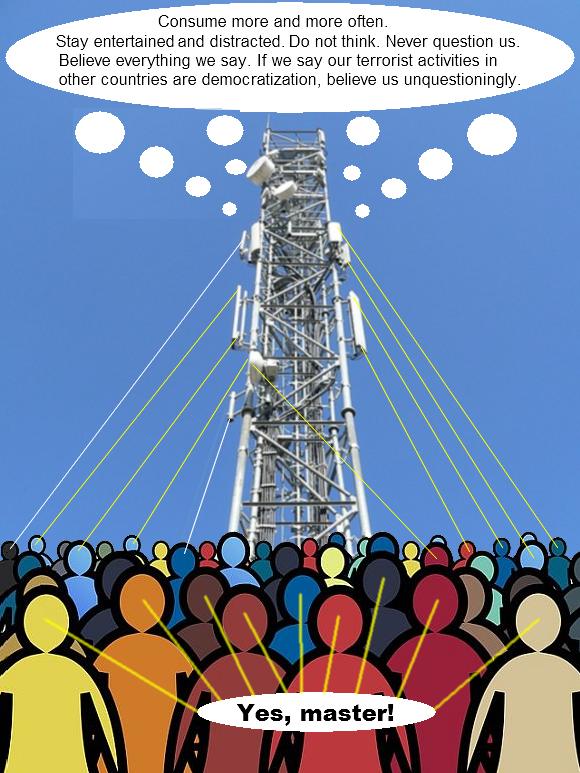To link to this article from your blog or webpage, copy and paste the url below into your blog or homepage.
Madness Overrated
a book by Esra Kus
(our site's book review)
The Amazon blurb says that Madness Overrated explores the mad dynamics of the consumption-based, growth-driven world and its undeniably powerful role in affecting virtually every aspect of our lives and reshaping our existence as humans.
The book presents deep-reaching observations on the human mind as it undergoes various changes while adapting to everything imposed onto it by society in the name of progress, productivity, and growth.

In the name of corporatocracy progress, we lose much of what it means to be truly human—progress is two-faced
The author encourages the readers to ask themselves honest questions about the mad lives we live and thereby rediscover our natural curiosity to look inquisitively behind the facades of the many illusions we were made to believe. She presents her vision for what the world looks like when experienced by balanced humans and what it means to really grow and make progress as a global society.

Her writing is intense and engaging, as well as provocative and caring. It is an earnest attempt to shake us out of the illusions of our rat race
The subject of the book is simply life, and how it has been "lost." We've gotten out of touch with life's true meaning in all the alienation and emptiness created by the corporate, growth-obsessed world and a shallow, social media dominated personal space. Her writing is intense and engaging, as well as provocative and caring. It is an earnest attempt to shake us out of the illusions of our rat race. It tries to help us break out of the shackles of our submission to an illusion of what our rat race consumer society tells us a “meaningful” life should look like. See Nearsighted: What The Elite Want You To See: 7 Essays to Cure Your Myopia.
Modern society’s role in reshaping human behavior is a topic which can be addressed from a scholarly and evidence-based direction. Society as a whole certainly has many blind alleys, distractions, and traps. This book is full of baseless claims that need to be supported with empirical evidence. That's why the science of sociology exists—so that people can support their ideas scientifically. Kus gets you to take a critical look at your life and the world surrounding you. Madness Overrated invites you to think deeply on every page.

The Forest Through The Trees: Like Kus, this website presents its own vision of what the world looks like when experienced by balanced humans and what it means to really grow and make progress as a global society
This website is created by people who have done this critical thinking, figured out what is going wrong, and come up with workable solutions—and lifestyles—that deal with the flaws, distractions, negativity, escapism, alienation, hollowness, and unsuccessful relationships and social structures. See The Big Answer, MCs—Frequently Asked Questions, The Forest Through The Trees, and MC Articles. Like Kus, this website presents its own vision of what the world looks like when experienced by balanced humans and what it means to really grow and make progress as a global society. Her vision is more general—ours is more specific. Prepare to be delighted!

There is evidence Kus has endured or at least seen one or more toxic or at least oppressive relationships, based upon her use of language in the book
There is evidence Kus has endured or at least seen one or more toxic or at least oppressive relationships, based upon her use of language in the book: "Caused by an inability to handle the trauma of life, the Mad Man's constant fear of losing ground and becoming vulnerable again manifests itself through an enormous need to dominate and control. He can never risk trusting anyone or anything in the universe. Relationships with others are composed of making judgments about them and taking advantage of their weaknesses so that he can bear his own. Always manifesting unattainable goals, unreasonable expectations, and excessive material possessions, he shows that he is the superior one, and he rules." See Bully Nation: How the American Establishment Creates a Bullying Society.
Being raised in Turkey as a female probably explains much of this slant on the "Mad Man"—who represents one exposed to and adjusting to the consumption-based, growth-driven world.
In our review for The Adjusted American: Normal Neurosis in the Individual and Society, we see "The implied goal for all of us trapped-in-alienation people is to break this constant alienation process so that we can take control over our lives, however, this is difficult because of how much this process of alienation is encouraged by social pressures to conform to a certain ideal image."

Thinking, responsible, autonomous individuals supporting politics, community and family were and are the magic formula—the balance to be struck—in Riesman-think. To Riesman, Alexis de Toqueville was right: the disease is conformity.
Riesman and the Putneys warned us about substituting others’ apparent liking of oneself (e.g., on Facebook or Twitter) in place of one’s own self-liking
In our review for The Lonely Crowd, we see "there are several main cultural types: tradition-directed, inner-directed, and other-directed are what most, but not all people are. The tradition-directed type conforms to whatever his culture has done before, the inner-directed type conforms to the superego (which nudges them to follow the guilt-fueled rules they learned in childhood, mostly from parents), and the other-directed type conforms to the 'crowd'—social, peer, media pressures. This type will 'go along to get along' and will get as many Facebook 'friends' as possible, trying for the impossible-to-achieve indirect self acceptance, thereby looking outside themselves for acceptance rather than looking toward their inner self. . . . he considers the other-directed mass conformity connections between people obsessed with consumption as a poor substitute for community. Thinking, responsible, autonomous individuals supporting politics, community and family were and are the magic formula—the balance to be struck—in Riesman-think."

Other-directed mass conformity connections between people obsessed with consumption are a poor substitute for community

Kus and others say Earth is for many an island of despair, where fear, alienation, distrust, avarice, and senseless indulgences dominate our existences and waste our life spans
"According to Wilson Bryan Key of Media Sexploitation fame: “We have, in a very real sense, sold out our individualism and freedom in return for a handful of baubles while we play-acted at being free individuals. . . . It is not difficult to conclude that man has done a superb job of conspiring unconsciously against finding out about himself. . . . Marketers . . . exploit our repressed needs for love, sex, recognition, identity, status, et al. . . . Knowledge of man’s ability to deceive himself through perceptual illusions would, to say the least, be highly embarrassing . . . man doesn’t run his life; his life runs him. He’s not at cause; he’s at effect. He’s told what he needs and wants in a way that pushes his buttons that relate to struggles to be loved during childhood, insecurities and fears about his or her attractiveness, hygiene, independence, manhood or womanhood. He’s vulnerable to advertising because he’s insecure in his being, other-directed (see The Lonely Crowd), and easy to manipulate by yanking the chains of his insecurities. . . . more stuff acquisition leads to less time for relationship or reflection on more human or profound areas, which leads to more shallowness and superficiality and alienation, which leads to even more motivation to fill the empty hole most of us feel inside.”

Man is easy to manipulate by yanking the chains of his insecurities

Propaganda keeps us obedient, distracted, consuming, but never questioning the CW, the media, the authorities
The True Story of Fake News: How Mainstream Media Manipulates Millions "reveals the real power the mainstream media has to shape our culture, our fears, and our tastes, and how it keeps us mesmerized by an endless stream of distractions and mindless drivel. They do not want us to think so we might detect the lies, the scams and the ripoffs they perpetrate. Instead, they want us to all be out chasing shiny objects." Kus knows this as well, saying that the Mad Man's business relies heavily on distracting others otherwise they might start questioning the CW, the media, and the authorities.

The mainstream media do not want us to think so we might detect the lies, the scams and the ripoffs they perpetrate—instead, they want us to all be out chasing shiny objects
As Kus says, "His [Mad Man's] evolutionary development on Earth is composed of strengthening his majestic appearance and skillfully controlling those he relies on to survive. He is powerful, attractive, destructive, opportunistic, stubborn, obsessive, inflexible, jealous, selfish, arrogant, and greedy. He is good at manipulating, packaging, selling, and yelling." This sounds EXACTLY like our current president: Donald Trump. And to consumerism and growth obsession we can add fighting and winning at all costs. Kus also mentions how the Mad Man builds and keeps building until the monuments of his power struggle with nature cover the planet. Trump again! And wealth accumulation expresses self worth to this Mad Man—Trump has billions of green, rectangular self-worth tokens. See Fear: Trump in the White House.
Kus says that the Mad Man dreams about building robots that function like humans, and this serves as the inspiration for his ideas about shaping humans into robots that can function perfectly as programmed machines.
Robert W McChesney and John Nichols, the authors of People Get Ready: The Fight Against a Jobless Economy and a Citizenless Democracy, say that new technologies will replace labor in the manufacturing, service, and professional sectors of an economy that is already struggling:
robot-maid

robot-grocery-checker

robot-businessman

robot-cop

robot-driver

robot-soldier

robot-photographer

robot-entertainer

robot-mover

robot-secretary

robot-waiter

robot-doctor

robot-artist

robot-barber

robot-hairdresser

robot-shoeshiner

robot-caregiving

robot-dogwalker

robot-construction

robot-musician

robot-bartender

robot-janitorial

robot-maintenance

robot-industry

robot-office

robot-fireman
Kus has a PhD in materials science and she has specialized in the corrosion and degradation of metals in various environments. But eventually her passion for understanding how metals degrade in negative environments was replaced with a passion for understanding how people degrade in negative environments and become Mad Men.





